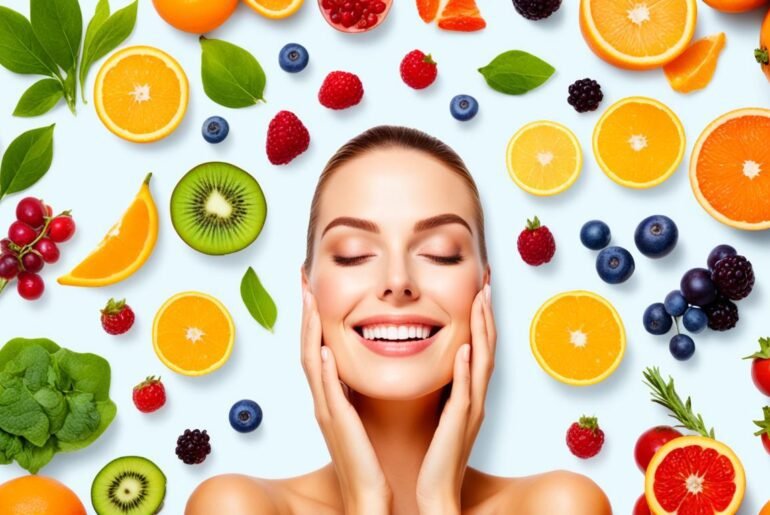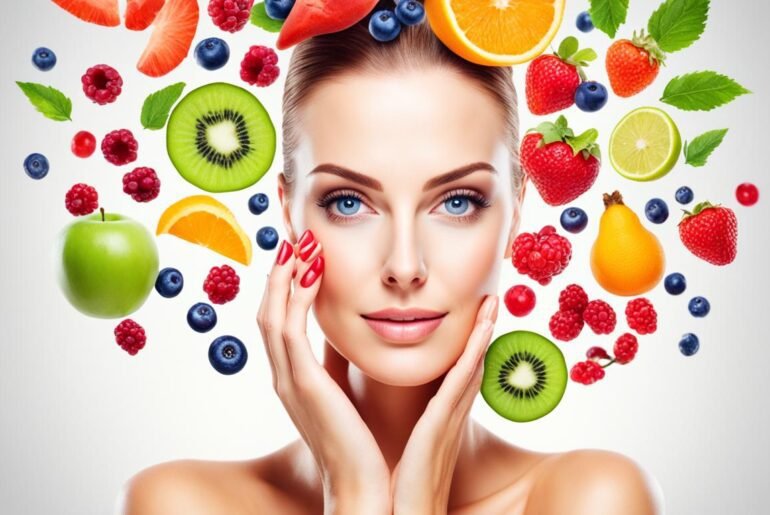Did you know that wrinkles are not just a natural part of aging, but also a result of reactive oxygen species (ROS) in our skin? ROS, generated by factors like UV radiation, contribute to skin aging and the formation of wrinkles. The good news is that antioxidants have been found to be effective in preventing and reducing the signs of aging caused by ROS. In this article, I will explore how antioxidants can play a crucial role in wrinkle reduction and overall skin health.
Key Takeaways:
- Reactive oxygen species (ROS) contribute to skin aging and wrinkle formation.
- UV radiation is a major source of ROS in the skin.
- Antioxidants help neutralize free radicals and prevent oxidative damage.
- Including antioxidant-rich foods in your diet can improve skin health.
- Topical application of antioxidant-rich products can provide direct benefits to the skin.
The Role of ROS in Skin Aging
Intracellular and extracellular oxidative stress caused by ROS contribute to skin aging and the formation of wrinkles. UV radiation enhances ROS generation in the skin, leading to accelerated aging. Understanding the mechanisms of ROS generation and the effects of ROS on the skin is crucial in developing strategies to prevent and reduce wrinkles.
Mechanisms of ROS Generation
ROS, or reactive oxygen species, are highly reactive molecules that are naturally produced in the body during cellular metabolism. They are also generated in response to external factors such as UV radiation, pollution, and lifestyle habits like smoking and poor diet. When ROS production exceeds the body’s natural defense mechanisms, oxidative stress occurs, resulting in damage to DNA, proteins, and lipids. This oxidative stress contributes to skin aging and the development of wrinkles.
Effects of ROS on the Skin
ROS have diverse effects on the skin, all of which contribute to the aging process. One major effect is the breakdown of collagen and elastin, two proteins that provide support and elasticity to the skin. ROS can also induce chronic inflammation, impair the skin’s natural barrier function, and interfere with the natural repair processes of the skin. Additionally, ROS can trigger the formation of advanced glycation end-products (AGEs), which contribute to the degradation of collagen and the stiffening of elastin fibers.
Preventing and Reducing Wrinkles
To prevent and reduce wrinkles, it is essential to combat oxidative stress and minimize ROS generation. This can be achieved through various approaches, including:
- Applying antioxidant-rich skincare products that neutralize free radicals and protect against oxidative damage
- Maintaining a healthy lifestyle, including a balanced diet rich in antioxidants
- Using sun protection measures, such as wearing sunscreen and protective clothing, to shield the skin from UV-induced ROS generation
By understanding the role of ROS in skin aging and implementing effective strategies to minimize their effects, it is possible to promote healthier, more youthful-looking skin and reduce the appearance of wrinkles.
The Importance of Antioxidants
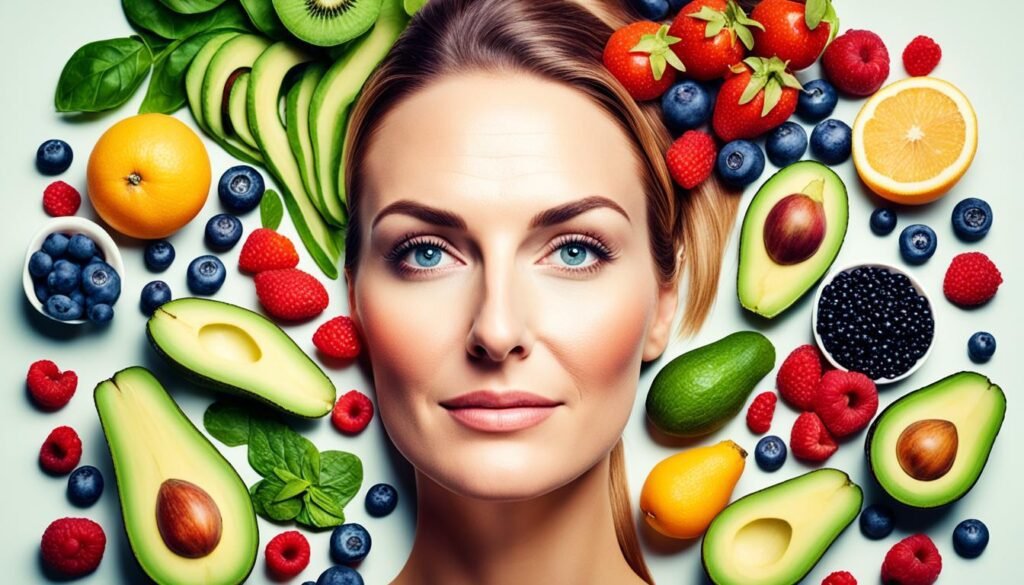
Antioxidants are crucial when it comes to combating the effects of reactive oxygen species (ROS) on the skin. These harmful molecules contribute to oxidative damage, which can lead to the formation of wrinkles and other signs of aging. By neutralizing free radicals and preventing oxidative stress, antioxidants play a vital role in protecting against wrinkle formation.
One of the best ways to ensure you’re benefiting from antioxidants is through natural sources. Incorporating antioxidant-rich foods into your diet, such as berries, leafy greens, and nuts, can provide your body with the necessary nutrients to combat oxidative stress and promote skin health.
Topical application of antioxidant-rich products is another effective method in the fight against wrinkles. By directly delivering antioxidants to the skin, these products can provide targeted protection and nourishment. Look for skincare products containing potent antioxidants like vitamins C and E, green tea extract, or coenzyme Q10 to improve the overall appearance and health of your skin.
Using antioxidants topically and consuming them through a balanced diet can provide synergistic benefits, helping to reduce the signs of aging and promote a more youthful complexion.
The Best Antioxidants for Anti-Aging
When it comes to choosing the best antioxidants for anti-aging, there are several key players to consider:
- Vitamin C: Known for its brightening and collagen-boosting properties, vitamin C is a powerful antioxidant that helps protect the skin against free radicals and UV damage.
- Vitamin E: This antioxidant not only moisturizes the skin but also helps reduce inflammation and protects against oxidative stress.
- Green Tea Extract: Rich in polyphenols, green tea extract helps fight against free radicals and can improve skin elasticity and texture.
These antioxidants can be found in various skincare products, ranging from serums to moisturizers, providing you with options to incorporate them into your daily routine and enhance your anti-aging skincare regimen.
Topical Antioxidants for Wrinkles
When it comes to addressing wrinkles, topical antioxidants can be highly effective. By applying antioxidants directly to the skin, you can target specific areas and provide the necessary nourishment to combat oxidative stress.
In addition to the antioxidants mentioned above, other powerful topical antioxidants include:
- Resveratrol: Found in red grapes and berries, resveratrol helps stimulate collagen production and protect against free radicals, reducing the appearance of wrinkles.
- Coenzyme Q10: This antioxidant supports skin repair and regeneration, helping to reduce the signs of aging and improve skin texture.
Integrating these topical antioxidants into your skincare routine can help minimize the appearance of wrinkles and promote smoother, healthier-looking skin.
Natural Wrinkle Reduction Methods
Besides incorporating antioxidants into your diet and skincare routine, there are other natural methods to reduce wrinkles. These methods work in synergy with antioxidants to enhance the overall anti-aging effects on the skin. Some natural ways to reduce wrinkles include:
- Hydration: Keeping your skin well-hydrated helps maintain its elasticity and plumpness, reducing the appearance of wrinkles.
- Sun Protection: Protecting your skin from harmful UV rays by wearing sunscreen and seeking shade can prevent premature aging and minimize wrinkle formation.
- Facial Exercises: Regularly performing facial exercises can help tone the muscles underlying the skin, reducing the appearance of wrinkles and promoting a more youthful look.
By adopting these natural wrinkle reduction methods alongside antioxidant-rich approaches, you can optimize your anti-aging efforts and promote healthier, more youthful-looking skin.
Types of Antioxidants for Skin
When it comes to improving skin health and reducing wrinkles, incorporating a variety of antioxidants into your routine is key. These powerful compounds can be found in numerous forms, each offering unique benefits for your skin. Here are some of the top types of antioxidants that are particularly beneficial for promoting skin health:
Vitamins C and E:
Vitamins C and E are potent antioxidants that work synergistically to protect the skin from oxidative damage caused by free radicals. Vitamin C helps stimulate collagen production, brighten the skin, and reduce the appearance of wrinkles, while vitamin E nourishes and moisturizes, promoting overall skin health.
Coenzyme Q10:
Coenzyme Q10 is a naturally occurring antioxidant that plays a vital role in the production of cellular energy. It helps neutralize free radicals and protects the skin from oxidative stress, ultimately reducing the signs of aging and supporting a more youthful complexion.
Green Tea Extract:
Green tea extract is rich in polyphenols, including a powerful antioxidant called epigallocatechin gallate (EGCG). Green tea extract helps combat inflammation, soothes the skin, and provides protection against UV-induced damage, making it an excellent addition to your skincare routine.
These antioxidants can be obtained not only through skincare products but also through a well-balanced diet. Including antioxidant-rich foods in your meals can provide additional nourishment for your skin and enhance its overall health. Here are some top antioxidant-rich foods to consider:
| Food | Antioxidant Content |
|---|---|
| Berries (blueberries, raspberries, strawberries) | High |
| Leafy greens (spinach, kale, Swiss chard) | High |
| Nuts and seeds (almonds, walnuts, chia seeds) | Moderate |
| Dark chocolate (70% cocoa or higher) | Moderate |
| Avocado | Moderate |
| Green tea | High |
Including these antioxidant-rich foods in your diet can provide essential nutrients that support skin health and contribute to a more radiant complexion. Alongside topical applications, a balanced diet rich in antioxidants is crucial for achieving optimal skin health and reducing the appearance of wrinkles.
By incorporating a range of antioxidant types, both through skincare products and a nutrient-rich diet, you can give your skin the nourishment it needs to thrive and combat the signs of aging. Next, we’ll explore the effects of antioxidants on skin aging and how they can help improve overall skin health.
The Effects of Antioxidants on Skin Aging
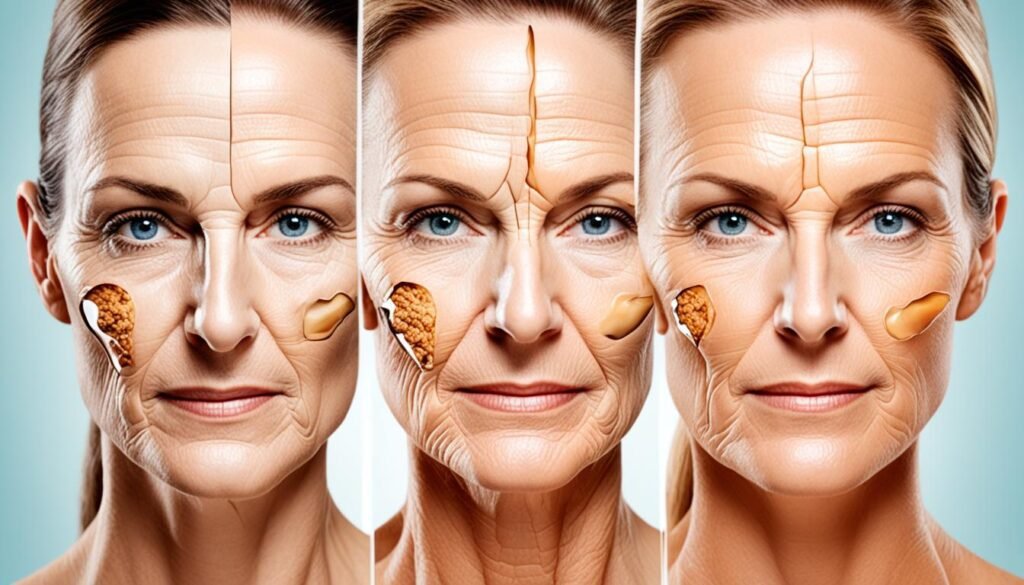
Antioxidants play a significant role in maintaining skin health and combating the signs of aging. These powerful compounds have been shown to have multiple effects on the aging process, helping to reduce inflammation, improve collagen production, protect against UV damage, and promote overall skin health.
One of the key benefits of antioxidants is their ability to combat oxidative stress. Oxidative stress occurs when there is an imbalance between the production of harmful free radicals and the body’s ability to neutralize them. This imbalance can lead to cellular damage, inflammation, and accelerated aging.
By neutralizing free radicals and reducing oxidative stress, antioxidants help to maintain the structural integrity of the skin and prevent the breakdown of collagen and elastin fibers. This leads to improved skin elasticity, firmness, and a reduction in the appearance of wrinkles and fine lines.
In addition to their protective effects, antioxidants also have anti-inflammatory properties. Inflammation is a common contributor to skin aging, and chronic inflammation can lead to the breakdown of collagen and the development of wrinkles. By reducing inflammation, antioxidants help to support the skin’s natural healing processes and maintain a youthful appearance.
Another important benefit of antioxidants is their ability to protect against UV damage. UV radiation is a major source of reactive oxygen species (ROS) in the skin, which can cause significant damage and accelerate the aging process. Antioxidants act as a defense mechanism against UV-induced oxidative stress, helping to prevent sunburn, DNA damage, and other harmful effects of UV exposure.
By promoting overall skin health, antioxidants contribute to a radiant complexion and a more youthful appearance. They help to improve skin tone and texture, reduce uneven pigmentation, and enhance the skin’s natural glow.
The Benefits of Antioxidants on Skin Aging
| Effect | Description |
|---|---|
| Reduces inflammation | Antioxidants help to calm inflammation in the skin, reducing redness and irritation. |
| Improves collagen production | Antioxidants stimulate collagen synthesis, improving the skin’s strength and elasticity. |
| Protects against UV damage | Antioxidants act as a shield against harmful UV rays, preventing sunburn and DNA damage. |
| Promotes overall skin health | Antioxidants support the skin’s natural functions, improving tone, texture, and radiance. |
With their ability to combat oxidative stress, reduce inflammation, protect against UV damage, and promote overall skin health, antioxidants are an essential component of any anti-aging skincare routine. Including antioxidant-rich foods in your diet and using topical antioxidant treatments can help to boost the effects of antioxidants and support long-term skin health.
The Benefits of Topical Antioxidant Application
When it comes to rejuvenating your skin and reducing wrinkles, topical antioxidants can deliver powerful benefits. By directly applying antioxidants to your skin, you can effectively protect against oxidative damage and promote a healthier, more youthful complexion.
Topical antioxidants have the unique ability to penetrate the skin and neutralize free radicals, which are unstable molecules that contribute to skin aging. Through this process, they provide a shield against oxidative stress and minimize the signs of aging, including the formation of wrinkles.
One of the key benefits of topical antioxidants is their ability to stimulate collagen production, a protein responsible for maintaining skin elasticity. By promoting collagen synthesis, antioxidants help to firm and tighten the skin, reducing the appearance of fine lines and wrinkles.
Not only do topical antioxidants protect and stimulate collagen production, but they also help to rejuvenate the skin on a cellular level. Antioxidants can promote cellular regeneration and repair, leading to a smoother and more radiant complexion.
Including antioxidant-rich skincare products in your routine can make a significant difference in the health and appearance of your skin. Look for products that contain topical antioxidants such as vitamins C and E, green tea extract, and coenzyme Q10.
By incorporating these antioxidant-rich products into your skincare regimen, you can experience the following benefits:
- Protection against oxidative damage
- Stimulation of collagen production
- Improved skin elasticity
- Promotion of cellular rejuvenation
- Reduction in the appearance of wrinkles
Unleash the power of topical antioxidants and unlock the secret to youthful, rejuvenated skin. With consistent use of antioxidant-rich skincare products, you can nourish your skin from the outside in and enjoy the transformative benefits of antioxidants for skin health.
The Role of Diet in Wrinkle Reduction
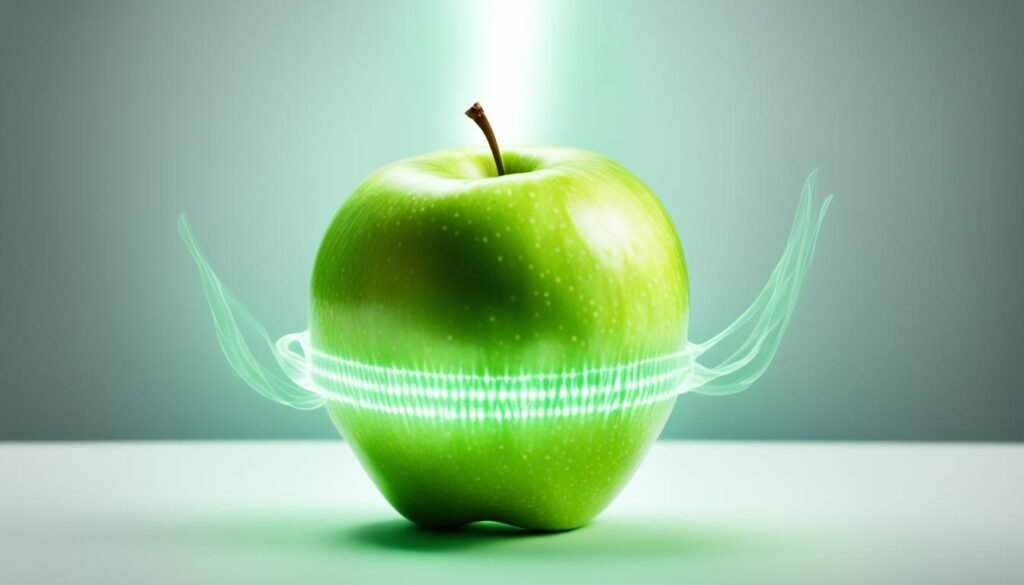
The role of diet in wrinkle reduction cannot be overstated. Consuming a diet rich in antioxidants is essential for protecting the skin against oxidative stress and reducing the signs of aging, including wrinkles.
An antioxidant-rich diet provides the necessary nutrients to combat the damaging effects of free radicals on the skin. Antioxidants help neutralize these harmful molecules, preventing them from causing oxidative damage that can lead to wrinkles.
Include antioxidant-rich foods in your diet, such as:
- Berries: Blueberries, strawberries, and raspberries are all packed with antioxidants that can help protect against skin aging.
- Leafy greens: Spinach, kale, and Swiss chard are excellent sources of vitamins and minerals that support skin health and reduce the appearance of wrinkles.
- Nuts: Almonds, walnuts, and pecans are rich in antioxidants, healthy fats, and vitamins that contribute to glowing skin and wrinkle reduction.
By incorporating these antioxidant-rich foods into your daily diet, you can nourish your skin from within, supporting its natural defenses against wrinkles and promoting a more youthful appearance.
“A diet rich in antioxidants can significantly contribute to maintaining a youthful appearance, as it helps combat the signs of aging, including wrinkles.” – Dr. Jane Thompson, Dermatologist
To further enhance the benefits of an antioxidant-rich diet, complement it with a proper skincare routine and sun protection. This holistic approach will maximize your efforts in reducing wrinkles and improving overall skin health.
Combating Wrinkles with Antioxidant Supplements

In addition to maintaining a healthy diet that includes antioxidant-rich foods, incorporating antioxidant supplements into your regimen can provide additional support for wrinkle reduction and overall skin health.
Several studies have shown that specific antioxidant supplements, such as vitamins C and E, resveratrol, and astaxanthin, have benefits for promoting skin health and improving the appearance of wrinkles.
Vitamin C is known for its powerful antioxidant properties and its ability to stimulate collagen production, which can help improve skin elasticity and reduce the appearance of wrinkles.
Vitamin E is another potent antioxidant that protects the skin against oxidative damage caused by free radicals. It also helps moisturize the skin, keeping it hydrated and supple.
Resveratrol, a natural compound found in red grapes and berries, has been shown to have anti-aging effects on the skin. It can help reduce inflammation, protect against UV damage, and improve overall skin tone and texture.
Astaxanthin, a carotenoid pigment found in algae and seafood, is a powerful antioxidant that can help protect the skin from photoaging caused by UV radiation. It has been shown to reduce wrinkles and improve skin elasticity.
Before starting any new supplement regimen, it is essential to consult with a healthcare professional, especially if you have any underlying medical conditions or are taking other medications.
| Antioxidant Supplement | Benefits for Skin |
|---|---|
| Vitamin C | Stimulates collagen production Improves skin elasticity |
| Vitamin E | Protects against oxidative damage Moisturizes the skin |
| Resveratrol | Reduces inflammation Protects against UV damage Improves skin tone and texture |
| Astaxanthin | Protects against photoaging Reduces wrinkles Improves skin elasticity |
By combining a healthy diet, topical antioxidant application, and antioxidant supplements, you can optimize your skincare routine and maximize the benefits of antioxidants for combating wrinkles and promoting overall skin health.
The Importance of Sun Protection
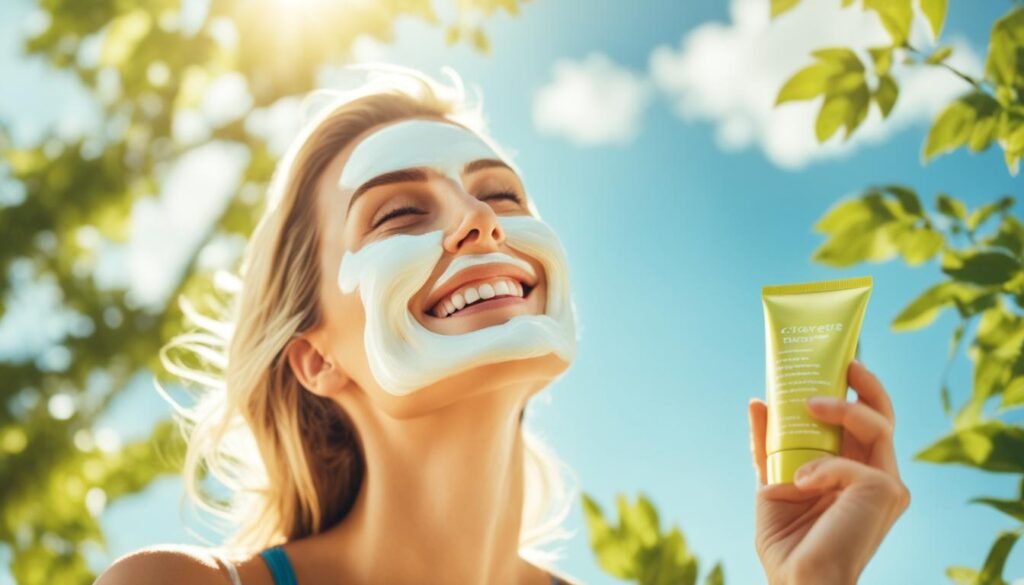
When it comes to preventing and reducing wrinkles, sun protection is absolutely crucial. The harmful UV radiation from the sun is a major contributor to the production of reactive oxygen species (ROS) in the skin, which can lead to accelerated aging and the formation of wrinkles. Therefore, taking proactive steps to shield your skin from UV damage is essential for maintaining a youthful and radiant complexion.
One of the most effective ways to protect your skin from the harmful effects of the sun is by using sunscreen. Make sure to choose a broad-spectrum sunscreen with a sun protection factor (SPF) of at least 30, and apply it generously to all exposed areas of your skin. Reapply every two hours, especially if you’re swimming or sweating.
Another important aspect of sun protection is wearing protective clothing, such as hats, sunglasses, and long-sleeved shirts, to shield your skin from direct sun exposure. Seeking shade during the hottest hours of the day, typically between 10 a.m. and 4 p.m., can also provide an additional layer of defense against UV rays.
By incorporating effective sun protection strategies into your daily routine, you can significantly reduce the risk of UV damage to your skin and minimize the signs of aging, including the formation of wrinkles. Don’t underestimate the power of sun protection – it’s one of the simplest yet most effective ways to maintain skin health and promote a youthful appearance.
The Future of Antioxidant Research
As we continue to delve into the world of anti-aging skincare, the future of antioxidant research holds great promise for advancements in wrinkle reduction and skin health. Scientists and researchers are dedicated to exploring new antioxidant compounds, innovative delivery systems, and advanced formulations to enhance the efficacy of anti-aging treatments.
With a deeper understanding of the mechanisms behind oxidative stress and skin aging, scientists are working towards developing more targeted and effective antioxidant-based solutions. These advancements aim to not only reduce the appearance of wrinkles but also improve overall skin texture and tone, providing individuals with a more youthful and rejuvenated complexion.
One area of focus is the exploration of novel antioxidant compounds derived from natural sources. Researchers are investigating the potential of unique botanical extracts and plant-based antioxidants that may possess superior anti-aging properties. By harnessing the power of nature, these compounds may offer innovative solutions for combatting wrinkles and preserving skin youthfulness.
In addition to seeking new antioxidant sources, scientists are also developing advanced delivery systems to ensure optimal absorption and effectiveness of antioxidant treatments. These delivery systems may utilize nanotechnology or other cutting-edge techniques to enhance the penetration of antioxidants into the deeper layers of the skin, where they can exert their maximum benefits.
Furthermore, researchers are constantly refining the formulations of antioxidant-based skincare products to improve their stability and potency. By optimizing the combination of antioxidants and other active ingredients, scientists aim to create synergistic formulations that provide enhanced benefits for wrinkle reduction and overall skin health.
Through the continued efforts of dedicated researchers, the future of antioxidant research holds immense potential for revolutionary anti-aging advancements. These advancements will not only enhance our understanding of the role antioxidants play in wrinkle reduction but also lead to the development of more targeted and effective treatments for promoting skin youthfulness.
Conclusion
The extensive research on the effect of antioxidants on wrinkle reduction has irrefutably shown their effectiveness. Incorporating antioxidants into your routine can help prevent and reduce the signs of aging, including wrinkles, by neutralizing free radicals and combating oxidative stress.
By adopting a comprehensive approach that includes a diet rich in antioxidant-packed foods, the use of topical antioxidant skincare products, and the inclusion of antioxidant supplements, you can promote skin health and maintain a more youthful appearance.
Additionally, don’t forget the importance of sun protection in your anti-aging skincare routine. Guarding your skin against UV radiation will help minimize the formation of wrinkles and further protect against oxidative damage.
Embracing the power of antioxidants is a proactive step towards achieving healthier and more radiant skin. By harnessing the antioxidant benefits of a well-rounded regimen and incorporating sun protection measures, you can reduce wrinkles and enjoy the long-lasting effects of a youthful-looking complexion.
FAQ
How do antioxidants help reduce wrinkles?
Antioxidants help neutralize free radicals and prevent oxidative damage, which can protect against wrinkle formation.
What are some examples of antioxidants for the skin?
Examples of antioxidants for the skin include vitamins C and E, coenzyme Q10, and green tea extract.
How can I incorporate antioxidants into my skincare routine?
You can incorporate antioxidants into your skincare routine by using antioxidant-rich products topically.
What are some antioxidant-rich foods for better skin health?
Foods rich in antioxidants for better skin health include fruits, vegetables, nuts, and seeds.
What effects do antioxidants have on skin aging?
Antioxidants can help reduce inflammation, improve collagen production, protect against UV damage, and promote overall skin health.
How do topical antioxidants benefit the skin?
Topical antioxidants can penetrate the skin, protect against oxidative damage, stimulate collagen production, improve elasticity, and promote skin rejuvenation.
Can diet affect wrinkle reduction?
Yes, consuming a diet rich in antioxidants can provide the necessary nutrients to combat oxidative stress and protect against wrinkles.
Are antioxidant supplements beneficial for reducing wrinkles?
Yes, antioxidant supplements such as vitamins C and E, resveratrol, and astaxanthin can support skin health and improve the appearance of wrinkles.
How important is sun protection in wrinkle reduction?
Sun protection is crucial in preventing and reducing wrinkles, as UV radiation is a major source of oxidative stress in the skin.
What does the future hold for antioxidant research and anti-aging advancements?
Scientists are continually exploring new antioxidant compounds, delivery systems, and formulations to enhance the efficacy of anti-aging treatments.


